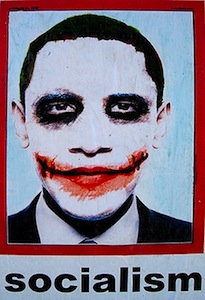
Remember when this was offensive?
That wasn't the only time Obama's defenders blasted those associating him with socialism as racist. "Right-wing attempts to paint Barack Obama as a socialist," argued an essay in The American Prospect, are "rooted in a history of conservative smears against black leaders." The Christian Science Monitor published an analysis of the "racist undertones of the 'socialist' epithet." In Salon, Michael Lind accused John McCain of blowing a "racial dog whistle" by linking Obama's policies to socialism.
Of course the racism charge was preposterous. Free-market advocates on the right have long decried leftist economic nostrums as socialist without anyone imputing racial animus to the criticism. But with Obama's rise as a political leader, the R-word became an all-purpose retort, no matter how far-fetched, to anything perceived as a put-down of the nation's first black presidential nominee. And for Democrats a decade ago, "socialist" was an insult to be rejected.
Is it still?
Senator Bernie Sanders, an avowed socialist, galvanized Democratic presidential primary voters in 2016 and is a leading candidate in the race for the 2020 nomination. Two members of the Democratic Socialists of America, Alexandria Ocasio-Cortez and Rashida Tlaib, were elected to Congress in last year's midterms. At California's Democratic state convention in San Francisco this month, former Colorado Governor John Hickenloooper was booed when he warned his party: "Socialism is not the answer."
According to a new survey from the Pew Research Center, socialism is now in quite good odor in the Democratic camp. Democrats holding a positive view of socialism (65 percent) dramatically outnumber those with a negative view (33 percent). Republicans, by contrast, overwhelmingly reject socialism; 84 percent express a negative view. Similarly, Gallup reported last summer that 57 percent of Democrats have a positive image of socialism, while only 47 percent expressed support for capitalism. To be sure, socialism remains decidedly unpopular among Americans in the aggregate. It is viewed favorably by only 37 percent. Democrats, however, do seem to be having something of a socialist moment.
I don't think it will last.
Sanders's unexpectedly robust campaign in 2016 wasn't just a political phenomenon but a cultural phenomenon. As millions of Democrats came to "feel the Bern" for the septuagenarian with the thick Brooklyn accent and the uncombed hair, the socialism which he had always espoused acquired a cachet as well. Last November's election of Ocasio-Cortez, and her sudden fame as a Democratic rock star, added to the buzz.
But buzz fades. Sanders is running a distant second among the 2020 Democratic hopefuls. There is less excitement about "feeling the Bern" than there was four years ago. When Sanders gave a speech this month that was billed as his definitive defense of socialism, it landed with barely a splash.
Meanwhile, leading Democrats steer clear of the socialist label.
"I do reject socialism," House Speaker Nancy Pelosi said flatly on "60 Minutes." "That is not the view of the Democratic Party." Sanders claims with justification that he has pushed Democrats' Overton Window leftward, yet even as his rivals endorse some of the most socialistic proposals ever aired in a presidential campaign (Medicare for All, the Green New Deal), none but Sanders identifies as socialist. Even Elizabeth Warren, running hard to the left, identifies herself as "a capitalist to my bones."
A candidate who criticizes socialism may be jeered at the California Democratic convention. But most candidates know that embracing socialism will, even in 2019, put them outside the circle of respectability among voters in general.
As it should.
Socialism is profoundly at odds with the American experience, and always has been. The Mayflower passengers who settled in Plymouth sought to build a socialist society avant la lettre, one in which, as Governor William Bradford later recounted, there would be no private ownership of property and "all profits and benefits" were to be part of "the common stock." The settlers wanted a system in which everyone would work for the common good, and there would be no inequality of wealth. What they got was a painful lesson in socialism's failures, with rising levels of hunger, corruption, and persecution. Only after the colony reversed course in 1623 and established private property rights did its fortunes change for the better.
It might be going too far to say that that early experience inoculated Americans against socialism. Still, mainstream America has never been tempted by the socialist claim that letting government control all property and direct the economy will lead to prosperity. Most of us know better. We see that wherever socialism has been imposed, its failures have been comprehensive: more poverty, less freedom, fewer resources, crippled agriculture, stunted growth, rising authoritarianism, and heartbreaking desperation. In just the last few years, socialism has destroyed Venezuela, turning the country with the highest standard of living in Latin America into an impoverished basket case.
Democrats may be beguiled these days by the seductive allure of the "socialist" label. Socialism in practice, however, is as much a nonstarter as ever. American voters have made some wild and crazy choices in recent years. But are they ready to go socialist? Not a chance.
Sign up for the daily JWR update. It's free. Just click here.
(COMMENT, BELOW)


 Contact The Editor
Contact The Editor
 Articles By This Author
Articles By This Author